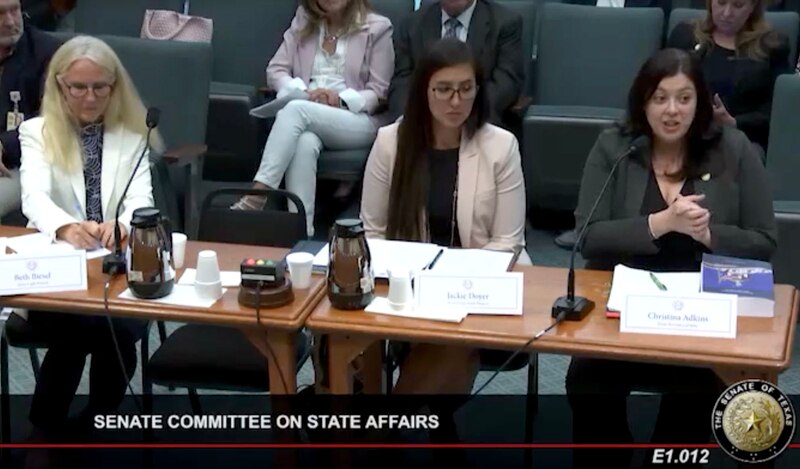Votebeat is a nonprofit news organization reporting on voting access and election administration across the U.S. Sign up for Votebeat Texas’ free newsletter here.
A top state election official acknowledged that Texas’ efforts to increase election transparency have made it easier to breach the secrecy of the ballot and discover how some people vote.
In testimony to state lawmakers Wednesday, Christina Adkins, the election division director for the Texas Secretary of State’s Office, confirmed reporting this week from Votebeat and The Texas Tribune that found the choices voters make in the private voting booth can later be identified in some cases using public, legally available records. Lawmakers and county election officials have made such records easier to access in recent years.
Adkins also confirmed that election officials and the Texas Secretary of State’s office have been concerned about the possibility that ballot secrecy was compromised.
“What we have discovered, and I think what a lot of election officials as a community have been very worried about, is that as we’ve increased this level of transparency, it has made this information easier to discover,” Adkins said.
She added: “It’s not just any one feature on a ballot. It’s usually a combination of records, maybe certain information about polling locations and where people vote, combined with the precinct number on that ballot.”
Soon after the November 2020 election, as former President Donald Trump and his allies promoted baseless theories that his reelection loss was caused by voting fraud, election-related public record requests increased. Requestors often asked to inspect original voted ballots, ballot images, and cast vote records — electronic records of how voters voted.
During the 2023 Texas legislative session, lawmakers responding to pressure from conservatives seeking more access to election records overwhelmingly passed House Bill 5180, allowing public access to those records just 61 days after election day.
Earlier this month, an independent news site published what it said was the ballot of former Republican Party of Texas Chair Matt Rinaldi, cast in the March 5 GOP primary. The site didn’t fully explain how it linked the ballot image to Rinaldi, who has neither confirmed nor denied that it was his ballot.
Votebeat and the Tribune were able to verify and replicate a series of steps to identify a specific person’s ballot choices using public records. But to protect the secrecy of the ballot, the two news outlets are not detailing the precise information needed or the process used to match ballot images with individual voters.
Adkins said the availability of election records is meant to promote “confidence and auditability” in elections.
But, she acknowledged, “The more data you put out there …, and the more granular and detailed that data gets, the more likely you are to run up against ballot secrecy. And what we’re seeing right now is that conflict between transparency and secrecy.”
At least some lawmakers said the state needs to reexamine what it’s making public and how, so that voters’ ballot choices remain secret, an essential aspect of free elections designed to guard against voter intimidation.

State Sen. Brian Birdwell, a Republican from Granbury, asked Adkins if his vote was accessible via public records requests.
“You ought to be able to audit by name, but not see the ballot,” he said.
State Sen. Paul Bettencourt, a Republican from Houston, acknowledged that in other states, information from very small precincts is aggregated into larger ones “to basically protect the voter from being pigeonholed by like, what happened in this case.” Bettencourt said he believes the Legislature would take bipartisan action to allow election officials to do that.
Any such action likely won’t happen before November’s elections, though. State lawmakers won’t begin debating and voting on new legislation until January.
But at least some witnesses said Wednesday that they don’t want access to election records rolled back.
“If you don’t let us see it, then how would we ever know if this is a legitimate vote or a legitimate voter?” asked Beth Beisel, a Dallas-based poll watcher and proponent of hand-counting ballots.
Election officials could redact more information in the public records to make it harder to tie a ballot to a specific voter. By law, county election officials are already required to redact identifiable information in election records such as Social Security numbers, state-issued identification numbers, and phone numbers. But Adkins said they’re permitted to do more, if necessary.
“What we thought was personally identifiable information is much broader than what we envisioned and what I think election officials envisioned originally,” she said.
The discussion on the issue Wednesday was part of a series of meetings the Senate will be hosting this week. Lt. Governor Dan Patrick released a list of 57 issues for Texas Senate committees to study in preparation for next year’s legislative session, including election security and the countywide polling place program.
The Senate committee hearing went long into the evening on Wednesday as lawmakers also heard public testimony on other issues. The committee will submit reports with its findings and will make policy recommendations before the end of the year.
Natalia Contreras covers election administration and voting access for Votebeat in partnership with the Texas Tribune. Contact Natalia at ncontreras@votebeat.org.



